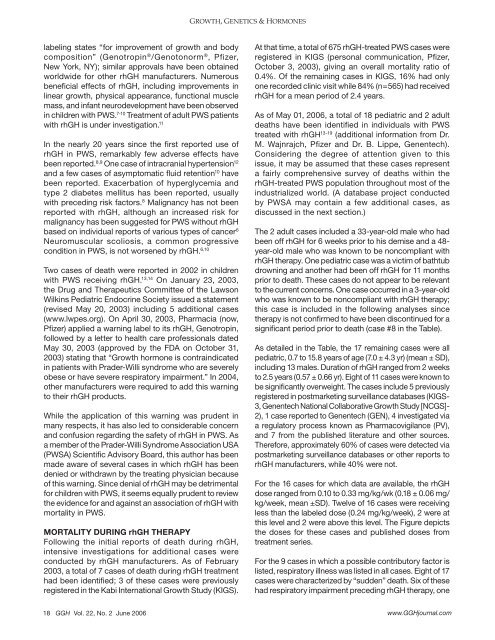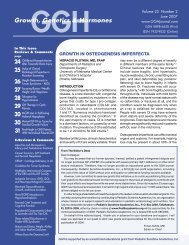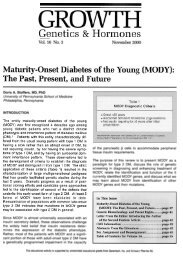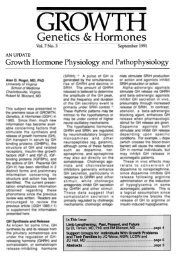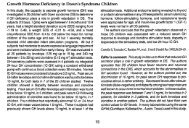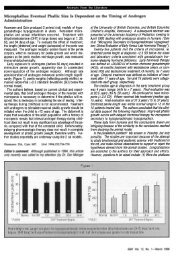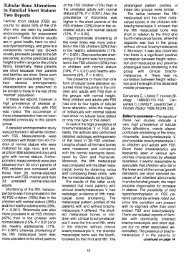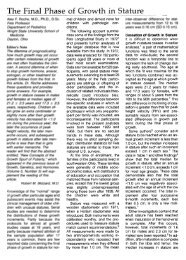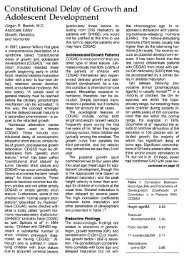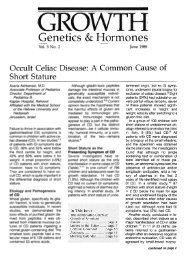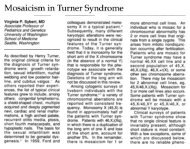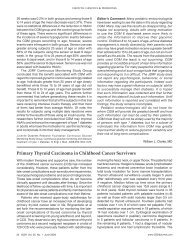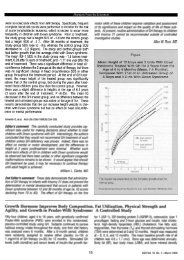Download pdf of current issue - GGH Journal
Download pdf of current issue - GGH Journal
Download pdf of current issue - GGH Journal
You also want an ePaper? Increase the reach of your titles
YUMPU automatically turns print PDFs into web optimized ePapers that Google loves.
GROWTH, GENETICS & HORMONES<br />
labeling states “for improvement <strong>of</strong> growth and body<br />
composition” (Genotropin ® /Genotonorm ® , Pfizer,<br />
New York, NY); similar approvals have been obtained<br />
worldwide for other rhGH manufacturers. Numerous<br />
beneficial effects <strong>of</strong> rhGH, including improvements in<br />
linear growth, physical appearance, functional muscle<br />
mass, and infant neurodevelopment have been observed<br />
in children with PWS. 7-10 Treatment <strong>of</strong> adult PWS patients<br />
with rhGH is under investigation. 11<br />
In the nearly 20 years since the first reported use <strong>of</strong><br />
rhGH in PWS, remarkably few adverse effects have<br />
been reported. 8,9 One case <strong>of</strong> intracranial hypertension 12<br />
and a few cases <strong>of</strong> asymptomatic fluid retention 10 have<br />
been reported. Exacerbation <strong>of</strong> hyperglycemia and<br />
type 2 diabetes mellitus has been reported, usually<br />
with preceding risk factors. 8 Malignancy has not been<br />
reported with rhGH, although an increased risk for<br />
malignancy has been suggested for PWS without rhGH<br />
based on individual reports <strong>of</strong> various types <strong>of</strong> cancer 6<br />
Neuromuscular scoliosis, a common progressive<br />
condition in PWS, is not worsened by rhGH. 6,10<br />
Two cases <strong>of</strong> death were reported in 2002 in children<br />
with PWS receiving rhGH. 13,14 On January 23, 2003,<br />
the Drug and Therapeutics Committee <strong>of</strong> the Lawson<br />
Wilkins Pediatric Endocrine Society <strong>issue</strong>d a statement<br />
(revised May 20, 2003) including 5 additional cases<br />
(www.lwpes.org). On April 30, 2003, Pharmacia (now,<br />
Pfizer) applied a warning label to its rhGH, Genotropin,<br />
followed by a letter to health care pr<strong>of</strong>essionals dated<br />
May 30, 2003 (approved by the FDA on October 31,<br />
2003) stating that “Growth hormone is contraindicated<br />
in patients with Prader-Willi syndrome who are severely<br />
obese or have severe respiratory impairment.” In 2004,<br />
other manufacturers were required to add this warning<br />
to their rhGH products.<br />
While the application <strong>of</strong> this warning was prudent in<br />
many respects, it has also led to considerable concern<br />
and confusion regarding the safety <strong>of</strong> rhGH in PWS. As<br />
a member <strong>of</strong> the Prader-Willi Syndrome Association USA<br />
(PWSA) Scientific Advisory Board, this author has been<br />
made aware <strong>of</strong> several cases in which rhGH has been<br />
denied or withdrawn by the treating physician because<br />
<strong>of</strong> this warning. Since denial <strong>of</strong> rhGH may be detrimental<br />
for children with PWS, it seems equally prudent to review<br />
the evidence for and against an association <strong>of</strong> rhGH with<br />
mortality in PWS.<br />
MORTALITY DURING rhGH THERAPY<br />
Following the initial reports <strong>of</strong> death during rhGH,<br />
intensive investigations for additional cases were<br />
conducted by rhGH manufacturers. As <strong>of</strong> February<br />
2003, a total <strong>of</strong> 7 cases <strong>of</strong> death during rhGH treatment<br />
had been identified; 3 <strong>of</strong> these cases were previously<br />
registered in the Kabi International Growth Study (KIGS).<br />
At that time, a total <strong>of</strong> 675 rhGH-treated PWS cases were<br />
registered in KIGS (personal communication, Pfizer,<br />
October 3, 2003), giving an overall mortality ratio <strong>of</strong><br />
0.4%. Of the remaining cases in KIGS, 16% had only<br />
one recorded clinic visit while 84% (n=565) had received<br />
rhGH for a mean period <strong>of</strong> 2.4 years.<br />
As <strong>of</strong> May 01, 2006, a total <strong>of</strong> 18 pediatric and 2 adult<br />
deaths have been identified in individuals with PWS<br />
treated with rhGH 13-19 (additional information from Dr.<br />
M. Wajnrajch, Pfizer and Dr. B. Lippe, Genentech).<br />
Considering the degree <strong>of</strong> attention given to this<br />
<strong>issue</strong>, it may be assumed that these cases represent<br />
a fairly comprehensive survey <strong>of</strong> deaths within the<br />
rhGH-treated PWS population throughout most <strong>of</strong> the<br />
industrialized world. (A database project conducted<br />
by PWSA may contain a few additional cases, as<br />
discussed in the next section.)<br />
The 2 adult cases included a 33-year-old male who had<br />
been <strong>of</strong>f rhGH for 6 weeks prior to his demise and a 48-<br />
year-old male who was known to be noncompliant with<br />
rhGH therapy. One pediatric case was a victim <strong>of</strong> bathtub<br />
drowning and another had been <strong>of</strong>f rhGH for 11 months<br />
prior to death. These cases do not appear to be relevant<br />
to the <strong>current</strong> concerns. One case occurred in a 3-year-old<br />
who was known to be noncompliant with rhGH therapy;<br />
this case is included in the following analyses since<br />
therapy is not confirmed to have been discontinued for a<br />
significant period prior to death (case #8 in the Table).<br />
As detailed in the Table, the 17 remaining cases were all<br />
pediatric, 0.7 to 15.8 years <strong>of</strong> age (7.0 ± 4.3 yr) (mean ± SD),<br />
including 13 males. Duration <strong>of</strong> rhGH ranged from 2 weeks<br />
to 2.5 years (0.57 ± 0.66 yr). Eight <strong>of</strong> 11 cases were known to<br />
be significantly overweight. The cases include 5 previously<br />
registered in postmarketing surveillance databases (KIGS-<br />
3, Genentech National Collaborative Growth Study [NCGS]-<br />
2), 1 case reported to Genentech (GEN), 4 investigated via<br />
a regulatory process known as Pharmacovigilance (PV),<br />
and 7 from the published literature and other sources.<br />
Therefore, approximately 60% <strong>of</strong> cases were detected via<br />
postmarketing surveillance databases or other reports to<br />
rhGH manufacturers, while 40% were not.<br />
For the 16 cases for which data are available, the rhGH<br />
dose ranged from 0.10 to 0.33 mg/kg/wk (0.18 ± 0.06 mg/<br />
kg/week, mean ±SD). Twelve <strong>of</strong> 16 cases were receiving<br />
less than the labeled dose (0.24 mg/kg/week), 2 were at<br />
this level and 2 were above this level. The Figure depicts<br />
the doses for these cases and published doses from<br />
treatment series.<br />
For the 9 cases in which a possible contributory factor is<br />
listed, respiratory illness was listed in all cases. Eight <strong>of</strong> 17<br />
cases were characterized by “sudden” death. Six <strong>of</strong> these<br />
had respiratory impairment preceding rhGH therapy, one<br />
18 <strong>GGH</strong> Vol. 22, No. 2 June 2006 www.<strong>GGH</strong>journal.com


